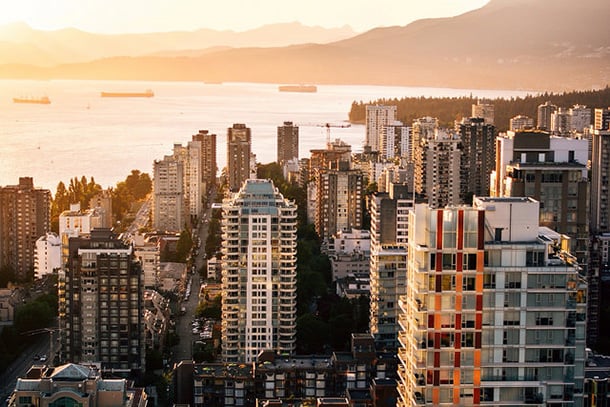While most of Canada's resource sectors are reeling from slow-down in the global economy, at least one of our globally significant assets is booming: British Columbia real estate. And as is sadly typical with most of Canada's intrinsic endowment, we have less oversight on foreign investment than almost any other nation of Earth.
Until the last week's budget, B.C. didn't even collect data on offshore ownership. Any figures came from the real estate industry -- hardly a disinterested party.
What we do know is the average sale price of Vancouver residential real estate ballooned 31 per cent last year. Province-wide, property assessments now top $1.3 trillion, half of which is concentrated in the Lower Mainland.
Greater Vancouver real estate is now worth more than $636 billion, up $89 billion since 2014. That tiny area -- less than one-third of one per cent of the province -- accounted for almost 70 per cent of the increase in provincial real estate values last year.
Is B.C. basically now a real estate economy? We like to think that traditional industries are still the major business driver, but is that true? Let's have a look at property values in comparison to what British Columbians typically believe propels our provincial prosperity.
Nothing else compares
We have heard a lot about the economic importance of natural gas and, climate implications aside, B.C. has significant deposits. Identified reserves in 2014 were about 1.5 trillion cubic metres, worth around $100 billion at today's prices. Yet this represents only 16 per cent of current property values in Metro Vancouver.
Forestry is another iconic B.C. industry. Since the 1940s, about 4.3 billion cubic metres have been logged from public land. Assuming a modest value of $60 per cubic metre, it would be worth some $250 billion at today's prices. This means all the B.C. trees logged since industrialized forestry began is still only equal to 20 per cent of current real estate values province-wide.
What about fishing? The entire landed value of all B.C. commercial fisheries in 2014 was $390 million. Assuming stocks hold up, we would to need to harvest similar catches for over 230 years to equal how much real estate in Vancouver ballooned last year alone.
And let's not forget about mining. A 2010 report from Natural Resources Canada itemized our mineral reserves. B.C. has about 64 per cent of Canada's copper, 16 per cent of its silver and virtually all its molybdenum. Based on current commodity prices (and disregarding the considerable extraction costs), our provincial mineral wealth is about $27 billion -- less than one-third of the increase in Greater Vancouver property values between 2014 and 2015.
Residential real estate, particularly in Vancouver, is eclipsing virtually every other aspect of our economy.
'It's the wild west'
The impact of foreign investment is hotly debated, despite the inexplicable lack of reliable data. However, many local experts conclude that outside capital is the only plausible explanation for our inflated housing market.
Let's assume that's true. As global warming makes other parts of the world increasingly unlivable, Canada and B.C. will become more desirable for people looking for a safe haven.
And unlike the humanitarian effort to settle refugees from Syria and elsewhere, this game of musical chairs favours the wealthy. In fact, a former immigration policy formalized this inequality, allowing people to jump the citizenship queue if they loaned $800,000 to the federal government. More than 130,000 people entered Canada under the program, which was seen as bargain compared to other jurisdictions.
The B.C. government said last week that property buyers will now have to declare their country of citizenship -- unless they already have permanent residence status in Canada. Vancouver immigration lawyer Richard Kurland says this is a significant loophole, telling the Globe and Mail that large numbers of "investor immigrants" have residence status.
Kurland thinks the province should require buyers declare where they pay income tax, a more accurate metric of their real home country. "Until there's a requirement to designate the source of funds behind the transaction, it's the wild west."
Theme park for the global elite
Economists from Simon Fraser University and the University of British Columbia have also proposed a property surcharge to target speculation by non-residents. Professor Shih En Lu, one of the authors of the report warns, "Vancouver could become dominated by low-skill workers serving millionaires that make their money elsewhere -- bad for growth, and bad for our ability to pay for public services."
Vancouver is a desirable place to live and will probably become more attractive in the decades to come. Is our city destined to be an unaffordable theme park for the offshore elite? Governments can develop policies that serve the public interest. But first we need to stop pretending that ballooning property values are a good thing.
Real estate is not the real economy. Ottawa and Victoria need to do something to deflate this bubble before even rental housing is out of reach. ![]()
Read more: Local Economy, Housing
















Tyee Commenting Guidelines
Comments that violate guidelines risk being deleted, and violations may result in a temporary or permanent user ban. Maintain the spirit of good conversation to stay in the discussion.
*Please note The Tyee is not a forum for spreading misinformation about COVID-19, denying its existence or minimizing its risk to public health.
Do:
Do not: